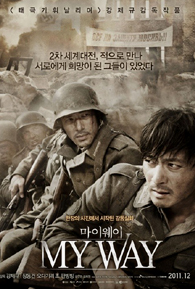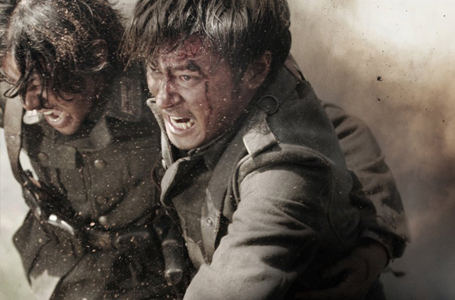
If all else fails, retreat.
— The Thirty Six Stratagems
A real man does not think of victory or defeat. He plunges recklessly towards an irrational death. By doing this, you will awaken from your dreams.
— Hagakure
It was Francois Truffaut who said that that making an anti-war film is an impossible task since war films generally involve some form of excitement on the part of the viewer to the extent that the needed revulsion for war would not be an emotional by-product of said viewing experience.
Trust the Korean filmmaker Kang Je-Gyu to create in My Way a war movie that manages to have its cake and eat it with regards to such an experience. It is on one hand one of the most exhilarating blockbuster war films I have ever seen, and on the other it manages to convey a distaste for war. Playing like a Call of Duty video game raised to the level of art, My Way is a story of courage, honour and survival in a world gone mad.
At its heart, My Way is about two runners. Jun-Shik (Jang Dong-Gun, Korea's Chow Yun Fat) is a colonial subject of the Japanese Empire in Korea when he meets Tatsuo (Joe Odagiri), on whose father's farm Jun-Shik's own father works, and both men are immediately attracted to each other's passion for running. When during an important marathon Jun-Shik despite being the superior runner is disqualified by the colonial Japanese authorities, a riot results that causes Jun-Shik and a few friends to be drafted into the Imperial Japanese Army as punishment. They are sent to Nanmonhon, Mongolia, on the Russian border where superior Soviet technology begins to decimate their unit. Jun-Shik proves to be a compassionate, life-valuing man who believes in survival. After a retreat causes his Japanese commanding officer to be demoted and commit seppuku, his unit receives a brutal new commander, Col. Hasegawa, who is none other than Tatsuo of years past.
The fierce Hasegawa wastes no time in whipping his new unit into shape as he plans to run not away from, but into death for victory's sake, by planning a suicidal mission against the Soviets, a mission that Jun-Shik, who has become de facto leader of the Koreans, objects to and escapes from with a few of his buddies.
Fate and chance entwine the lives of Jun-Shik and Tatsuo as they end up facing off Soviet tanks, being transported to a Siberian work camp, engaging Nazi machine gun nests, and even seeing action on D-Day while serving in the German Ostlegionen (that's right, the Nazis did have units comprised of non-blonde Aryans).
As the above description would suggest, Kang Je-Gyu wastes nothing in choreographing some of the most exhilarating combat sequences ever captured on film: from Michael Bayesque bomb's-eye view shots on D-day to Hasegawa slicing and dicing his way with a samurai sword as he wades into a Russian armoured unit. Where Kang also handles equally well is with his uncompromising insight into human nature: war's evil is that it makes virtues of what would otherwise be vices in peace: murder, rape, torture all become laudable as long as it is practiced on an enemy, and opposition to that becomes unlawful or labeled evil. As the film progresses, its characters grow in depth. Hasegawa's hardass brutality also belies a deep sense of duty and compassion and willingness to share in his men's hardships, while a once-pitiful and naive Korean soldier becomes a brutal and cruel man when he is rechristened Anton and made supervisor of the Soviet Work Camp, during which he tortures, kills and beats up his former Japanese tormentors with sadistic zeal. Kang humanizes nearly every side of the conflict, be they Japanese, Korean, Chinese (in the form of a beautiful sniper played by Fan Bingbing), German or Russian, and by doing so despite keeping his action sequences exhilarating as ever, he still manages to disabuse one of illusions of there being a 'Good War'.
As quoted at the beginning of this review, one of the foremost tactics in the Chinese Thirty Six Strategems is to retreat. In creating a war film with a hero whose specialty is running, the film extends the philosophy behind this strategy into something deeply noble and grand: in a world gone mad, perhaps running away and retreating requires the greatest moral and physical courage of all.
P.S. The film also has to be lauded for highlighting some of the more complex aspects of World War II, especially that of Koreans serving in the Japanese Army, and Middle Easterners serving in the Nazi Ostlegionen. These are often neglected by World War II movies that frame the conflict as a 'triumph over racial supremacist evil', and don't do justice to the complexity of the war as a whole.












 Printable Version
Printable Version











Reader's Comments
Be the first to leave a comment on this page!
Please log in to use this feature.